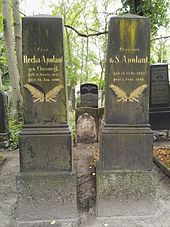Samuel Apolant
Samuel Apolant (born February 14, 1823 in Deutsch Krone , West Prussia ; died September 5, 1898 in Berlin ) was a German rabbi .
Life
Samuel Apolant was the son of the innkeeper Lewin Apolant and his wife Miriam Perl. Up to the age of 17 Apolant initially pursued private Talmudic studies . He then went to Berlin to pursue private humanistic studies there. On October 5, 1846, he made his external Abitur at the Köllnisches Gymnasium .
That same month matriculated he on October 28 at the Humboldt University of Berlin and studied Philosophy , Education and Jewish Studies . During his studies he worked voluntarily as a Greek teacher at the Jewish "Study Transport Association".
After completing his three-year university studies, Apolant began working as a preacher and religious teacher in Potsdam in October 1849 . On February 23, 1850 he was at the University of Halle with his dissertation De Hebraeorum judiciis a Moses usque ad primum Hebraeorum exsilium doctorate .
Nine months later he married on November 18, 1850 Rachel (Recha) Chronegk (1827-1900), the daughter of the merchant Samuel Leiser Chronegk from Schloppe , since 1823 citizens in Brandenburg and in 1839 officially citizens of Berlin, and Ernestine life home . The marriage resulted in the son Hugo Apolant , who later became a doctor.
When the civic equality of the Jews also brought the Potsdam Jews full recognition as "citizens", the local Jewish community elected its preacher Samuel Apolant as its first academically trained rabbi in 1851 . Under Apolant's influence, the Jewish women's association and the Chewra Kadischa came into being . He was a fighter for liberal Judaism and implemented reforms in worship and in the Jewish teaching and education system. This eventually split the church.
Apolant introduced religious instruction for boys and girls together. Under his leadership, all school-age children of the Jewish community from the age of 8 were taught Hebrew , religion and elementary subjects in the synagogue . He subjected the lessons, which had previously been left to the parents' free will, to strict regulations, organized them systematically and introduced discipline. Apolant was also considered an excellent educator . In 1857 he handed over "the school system in the community in excellent condition", as his successor Tobias Cohn attested.
In 1858 Apolant returned to Berlin as a preacher at the Meyerbeer Synagogue . There he also worked as a teacher at the secondary school for children of the Jewish community in Heidereutergasse 5 next to the synagogue, for which he also temporarily took over management from 1868. He also taught at the Sophienschule (1876–1879), at the Friedrichsgymnasium and at the “Baruch Auerbach'schen orphan education institutions” (1869–1893).
In addition to his speeches, such as his celebratory speech in celebration of the silver wedding of the Prince and the Princess of Prussia (1854) or his words on the bier of the city councilor and city bailiff Moritz Meyer (1869) and several articles, Apolant published his guideline for systematic teaching in the Jewish religion as well as his textbook for the systematic instruction in the Jewish religion (both Verlag Emil Apolant , Berlin 1895).
Apolant was a member of the "Association for the Support of Jewish Teachers in Prussia". In 1903 the "Samuel and Eugen Apolant Foundation" was established in his memory to support Jewish teachers.
Apolant and his wife are buried in the row of honor at the Weißensee cemetery in Berlin (graves 14 and 15 from the right).
literature
- Michael Brocke , Julius Carlebach (Hrsg.): Biographisches Handbuch der Rabbis. Part 1, KG Sauer Verlag, Munich 2004, ISBN 3-598-24871-7 , page 144 ( digitized version ).
- Julius Hans Schoeps : Jews in Berlin. Volume 2, Verlag Henschel, 2005, ISBN 3894874619 or ISBN 9783894874612 , page 17 ( excerpt ).
- Robert Kaelter, Klaus Arlt: History of the Jewish community in Potsdam. In: Writings of the Moses Mendelssohn Center for European-Jewish Studies. Edition Hentrich, 1903, ISBN 3894680733 or ISBN 9783894680732 .
Web links
Individual evidence
- ↑ The date September 5, 1898 is said to be engraved on his tombstone . The entry in the death register (Berlin registry office I, II No. 774/1898) also includes the date September 5, 1898.
- ↑ Works from the University and State Library of Saxony-Anhalt in Halle a. D. Saale. Volume 3, Deutscher Verlag der Wissenschaften, 1953, page 414 ( excerpt ).
- ↑ With his election, the Potsdam community ended the long period without its own pastor. In the years between 1794 and 1851, the Berlin rabbis Hirsch and Dr. Öttinger (1832) took on this task. - After Apolant's six years of activity, Tobias Cohn succeeded as rabbi in 1857 , who held this office for 39 years.
- ↑ This women's association should help improve the position of women in Jewish life.
- ^ Sigrid Grabner, Knut Kiesant: 1000 years of Potsdam. Ullstein Verlag, 1992, page 116 ( excerpt ).
- ^ Birgit Kletzin: Strangers in Brandenburg. 2003, page 165 ( digitized version ).
- ↑ 33 contributions to the history of ophthalmology. Julius Hirschberg Gesellschaft, Facultas Universitätsverlag, 1991, page 40 ( excerpt ).
| personal data | |
|---|---|
| SURNAME | Apolant, Samuel |
| BRIEF DESCRIPTION | German rabbi and author |
| DATE OF BIRTH | February 14, 1823 |
| PLACE OF BIRTH | German Crown , West Prussia |
| DATE OF DEATH | September 5, 1898 |
| Place of death | Berlin |
